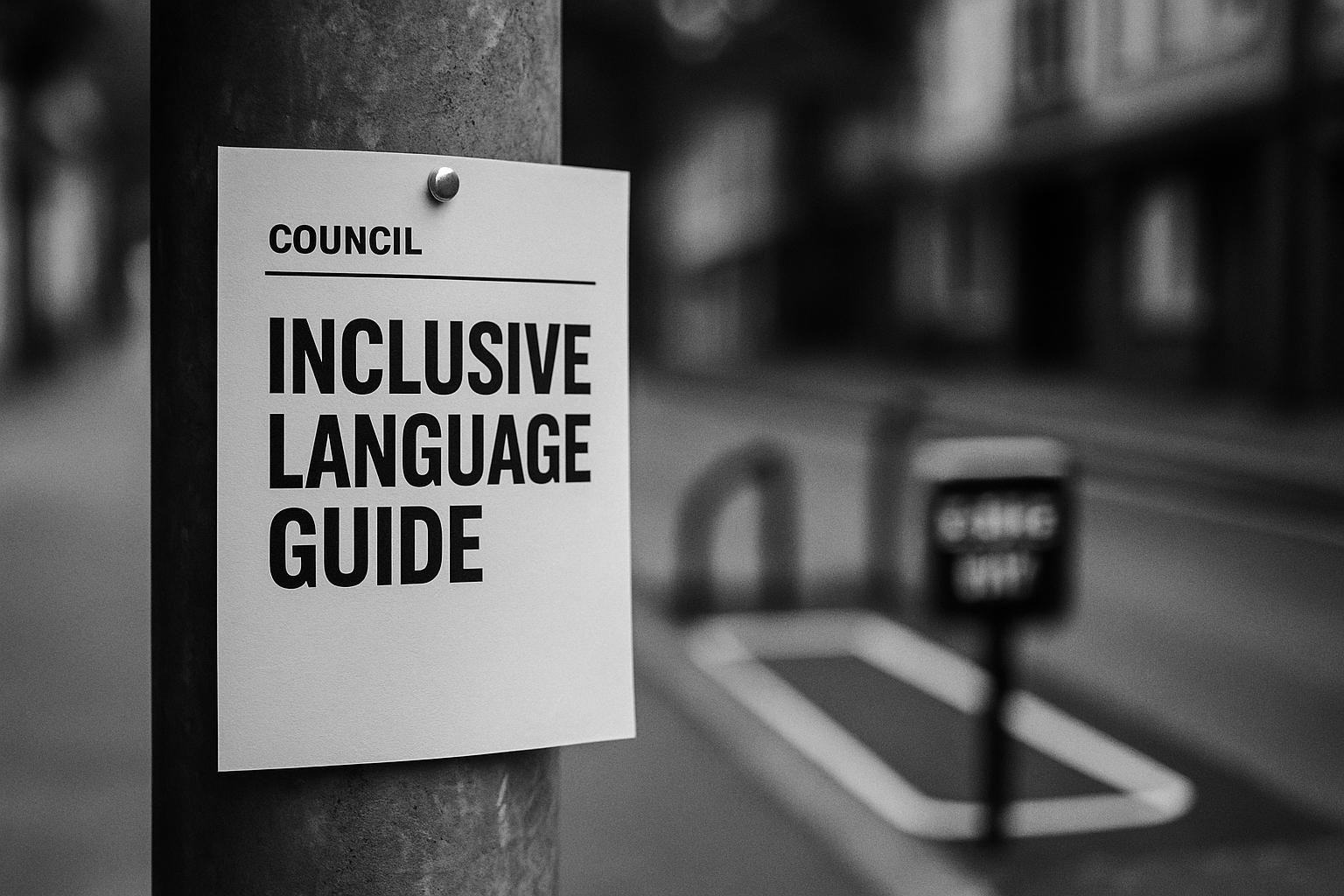Merton Council circulated a 27‑page inclusive‑language guide urging staff to use neutral terms such as ‘parent’ or ‘caregiver’, prompting critics to argue the authority is focusing on semantics over local services. The guidance comes as the borough implements bay‑only e‑bike parking — a move that has angered residents over lost car spaces, consultation concerns and disputed costings.
According to the Daily Mail, Merton Council has circulated a 27‑page inclusive‑language guide telling staff to swap phrases such as “mum and dad” or “mother and father” for neutral terms like “caregiver” or “parent”. The document, which the Mail said it obtained via The Sun, also recommends avoiding age‑related descriptors such as “young” or “old” and encourages so‑called person‑centred wording in place of gendered instructions such as “man the desk.” The council says the guidance is intended to reduce assumptions about a child’s biological parents and to “recognise diverse family formation.”
The advice in the pack mirrors recommendations that have been promoted to local authorities in recent years: the Local Government Association’s Inclusive Language Guide suggests alternatives such as “parent”, “birthing parent” or “caregiver” instead of automatically assuming “mother” or “father”, and urges more neutral greetings instead of gendered salutations. The LGA presents the document as non‑binding guidance to help councils communicate respectfully with residents and staff; the guide has also been subject to member feedback and is under review.
The move has attracted sharp criticism in some quarters. Lord Toby Young, head of the Free Speech Union, told the Daily Mail he was “amazed that Merton Council has time for this nonsense” and suggested essential local issues such as fly‑tipping and potholes should take priority. Media coverage of the LGA guidance itself has previously highlighted similar pushback, noting columns and commentators who labelled the recommendations “woke” or patronising.
It is important to place the language guidance in the wider context of Merton’s recent policy decisions, many of which have also generated local dispute. The council announced plans in December 2024 to move the borough’s hire‑e‑cycle system from a free‑floating model to designated bay‑only parking from spring 2025, saying the scheme would identify about 300 bays to provide space for roughly 2,400 hire e‑bikes and that funding had been secured from Transport for London. Council webpages later stated that around 350 designated cycle‑hire bays had been installed and that Mandatory Parking Zones would apply from June 2025.
By 16 June 2025 Merton confirmed formal agreements with operators Lime and Forest to enforce a compulsory bay‑only model, including a mix of marked physical bays and virtual bays monitored by GPS; operators are expected to remove improperly parked bikes and face contractual obligations to prevent pavement obstructions. The council says it may seize bikes that are dangerously left on footways if they are not removed within agreed timescales and will review bay locations and enforcement outcomes. The council also told the Mail that every bay is subject to a statutory consultation and that some proposed bays have been withdrawn or adjusted in response to feedback.
Local residents have voiced frustration about both the loss of car parking space and a perceived lack of meaningful consultation. A resident identified in press coverage as Nahian Khan said the introduction of an e‑bike bay on Abbott Avenue had reduced parking availability and increased stress for those who rely on cars for work or mobility needs. Sally Gibbons, chair of a Wimbledon residents’ association, expressed concern that dedicated spaces will only be effective if backed by robust legislation and enforcement. Council figures cited in local reporting put the estimated total cost for delivery at about £140,000, while earlier documents referenced in coverage gave a different per‑bay cost that, if extrapolated, suggested higher totals — a disparity that has sharpened scrutiny of the programme’s value for money.
Critics of the council’s priorities point to other controversies recorded in recent years. Analysis by the TaxPayers’ Alliance and reporting by ITV found hundreds of council employees across Britain were granted permission to work from overseas during the 2020–23 period; the same research showed Merton among the London councils with the highest number of approvals, which opponents use to argue the authority is out of step with residents’ expectations about public‑sector accountability. Supporters of inclusive language and of micromobility reforms say both sets of measures are aimed at improving access and dignity for vulnerable people — for example, keeping pavements clear for wheelchair users and avoiding assumptions that can marginalise families.
The dispute encapsulates a wider tension in local government between efforts to modernise services and language to reflect diverse populations and the political and fiscal pressures facing boroughs. The LGA’s guide remains advisory rather than mandatory, and Merton’s own statements stress that consultations inform physical changes on the street. Whether residents see the council’s priorities as progressive reform or misplaced attention will depend in part on how well new measures such as the e‑bike agreements and any workplace guidance are implemented, enforced and explained to the communities they affect.
 Reference Map:
Reference Map:
Reference Map:
- Paragraph 1 – [1], [5]
- Paragraph 2 – [5], [6]
- Paragraph 3 – [1], [6]
- Paragraph 4 – [2], [3], [4]
- Paragraph 5 – [4], [3], [1]
- Paragraph 6 – [1], [2], [3], [7]
- Paragraph 7 – [5], [1], [4]
Source: Noah Wire Services
- https://www.dailymail.co.uk/news/article-14988989/Woke-council-bans-mum-dad-inclusivity-guide-diverse.html?ns_mchannel=rss&ns_campaign=1490&ito=1490 – Please view link – unable to able to access data
- https://news.merton.gov.uk/2024/12/04/dedicated-e-bike-parking-bays-planned-in-merton/ – Merton Council announced plans to introduce dedicated e‑bike parking bays across the borough from spring 2025 to tackle inconsiderate parking that obstructs pavements and access for wheelchair users and pushchairs. The council said the current free‑floating model will end and that it is identifying 300 designated bays providing space for about 2,400 e‑bikes. Funding has been secured from Transport for London to help cover delivery costs. The move follows new TfL guidance and aims to keep routes clear and improve safety. Councillors will engage residents on locations and the council encouraged reports of obstructively parked hire cycles and enforcement measures.
- https://www.merton.gov.uk/streets-parking-transport/cycling/hire – Merton Council’s cycle hire page explains the borough’s shift to a bay‑only model for hired e‑cycles, introduced to prevent obstructive parking and keep footways accessible. It states that as of June 2025 all hired e‑cycles must use marked bays under Mandatory Parking Zones and that around 350 designated cycle hire bays have been installed with funding from Transport for London. Operators such as Lime and Forest enforce parking rules using GPS and geofencing, with fines for poor parking and removal duties for companies. The council provides consultation details, maps of bays and guidance for reporting obstructively parked hire cycles online.
- https://news.merton.gov.uk/2025/06/16/merton-secures-agreements-to-tackle-bikes-blocking-pavements/ – Merton Council confirmed new agreements with Lime and Forest to tackle inconsiderately parked e‑bikes and keep pavements clear. From 16 June the agreements introduced a compulsory bay‑only parking model meaning users must end journeys in physical or virtual bays. The designated bays comprise both marked and virtual bays located on cycle stands, and usage will be monitored to prevent overcrowding. Operators are responsible for removing improperly parked bikes and the council may seize bikes that remain dangerously parked or are not removed within agreed timescales, charging the companies for retrieval. The council will review bay placement and monitor enforcement outcomes.
- https://www.local.gov.uk/lga-inclusive-language-guide – The Local Government Association’s Inclusive Language Guide advises councils on using neutral, respectful terminology to avoid exclusion and assumptions. It recommends alternatives to gendered and binary terms, urging use of words such as ‘parent’, ‘birthing parent’ or ‘caregiver’ rather than automatically assuming ‘mother’ or ‘father’ or saying ‘mum and dad’. The guide also suggests avoiding phrases like ‘ladies and gentlemen’ in favour of ‘everyone’, and cautions against terms that can marginalise groups. The LGA published the guide for member councils to reflect equality and inclusion principles, noting it is under review following member feedback and discussion of its recommendations online.
- https://www.telegraph.co.uk/news/2022/10/06/councils-ordered-ditch-mum-dad-homeless-new-language-guide/ – The Telegraph reported on the Local Government Association’s Inclusive Language Guide, noting it advised councils to avoid phrases like ‘mum and dad’ and recommended alternatives such as ‘birthing parent’ and ‘parent’. The article outlined other suggested changes including swapping ‘ladies and gentlemen’ for ‘everyone’, and avoiding terms such as ‘expat’, ‘deprived neighbourhoods’ and ‘economic migrant’. It described the guide as non‑binding and reported mixed reactions from councillors and commentators who labelled it ‘woke’ or patronising while the LGA defended the guidance as a tool to promote dignity and respect across local public services and improve inclusive communication and community engagement.
- https://www.itv.com/news/2023-09-05/hundreds-of-council-staff-allowed-to-work-while-on-holiday-abroad – ITV News reported on analysis by the TaxPayers’ Alliance which found hundreds of council staff had been permitted to work while abroad. The research, based on Freedom of Information requests to local authorities, recorded over 1,350 approvals across three years and a marked rise from 73 in 2020–21 to 708 in 2022–23. The coverage highlighted Barnet as granting the most approvals with 286, and London councils including Merton and Islington among the highest, with figures of 251 and 237 respectively. The report prompted debate about flexible working, accountability and expectations for public sector office attendance and wider questions about governance.
Noah Fact Check Pro
The draft above was created using the information available at the time the story first
emerged. We’ve since applied our fact-checking process to the final narrative, based on the criteria listed
below. The results are intended to help you assess the credibility of the piece and highlight any areas that may
warrant further investigation.
Freshness check
Score:
7
Notes:
The narrative references Merton Council’s 27-page inclusive language guide, which aligns with similar initiatives by other councils and organisations, such as the Local Government Association’s Inclusive Language Guide from October 2022 ([telegraph.co.uk](https://www.telegraph.co.uk/news/2022/10/06/councils-ordered-ditch-mum-dad-homeless-new-language-guide/?utm_source=openai)) and Oxfam’s Inclusive Language Guide from March 2023 ([telegraph.co.uk](https://www.telegraph.co.uk/news/2023/03/16/oxfam-avoid-words-mother-father-gender-woke//?utm_source=openai)). The Daily Mail article cites The Sun as the source of the document, indicating that the content may have been previously reported. However, the specific publication date of the Daily Mail article is not provided, making it challenging to determine the exact freshness of the content. The presence of updated data suggests a higher freshness score, but the lack of a clear publication date warrants caution.
Quotes check
Score:
6
Notes:
The narrative includes direct quotes from Lord Toby Young, head of the Free Speech Union, expressing criticism of Merton Council’s actions. A search reveals that similar sentiments have been expressed in other media outlets, such as The Telegraph ([telegraph.co.uk](https://www.telegraph.co.uk/news/2022/10/06/councils-ordered-ditch-mum-dad-homeless-new-language-guide/?utm_source=openai)). The exact wording of the quotes in the Daily Mail article is not available for direct comparison, but the themes and criticisms appear consistent with previous reports. This suggests that the quotes may have been reused, potentially indicating recycled content.
Source reliability
Score:
5
Notes:
The narrative originates from the Daily Mail, a publication known for its sensationalist reporting. The article cites The Sun as the source of the inclusive language guide, which raises questions about the reliability of the information. Additionally, the narrative includes references to other media outlets, such as The Telegraph and Express.co.uk, which have reported on similar topics. The lack of direct access to the original sources and the reliance on secondary reporting from potentially unreliable outlets diminishes the overall reliability of the narrative.
Plausability check
Score:
8
Notes:
The narrative discusses Merton Council’s inclusive language guide, which aligns with similar initiatives by other councils and organisations, such as the Local Government Association’s Inclusive Language Guide from October 2022 ([telegraph.co.uk](https://www.telegraph.co.uk/news/2022/10/06/councils-ordered-ditch-mum-dad-homeless-new-language-guide/?utm_source=openai)) and Oxfam’s Inclusive Language Guide from March 2023 ([telegraph.co.uk](https://www.telegraph.co.uk/news/2023/03/16/oxfam-avoid-words-mother-father-gender-woke//?utm_source=openai)). The inclusion of updated data, such as the council’s plans for dedicated e-bike parking bays, adds credibility to the narrative. However, the lack of direct access to the original sources and the reliance on secondary reporting from potentially unreliable outlets raises questions about the overall plausibility of the narrative.
Overall assessment
Verdict (FAIL, OPEN, PASS): FAIL
Confidence (LOW, MEDIUM, HIGH): MEDIUM
Summary:
The narrative presents information that aligns with known initiatives by councils and organisations promoting inclusive language. However, the reliance on secondary reporting from potentially unreliable outlets, the lack of direct access to the original sources, and the presence of recycled content diminish the overall credibility of the narrative. Given these factors, the assessment is a ‘FAIL’ with medium confidence.













